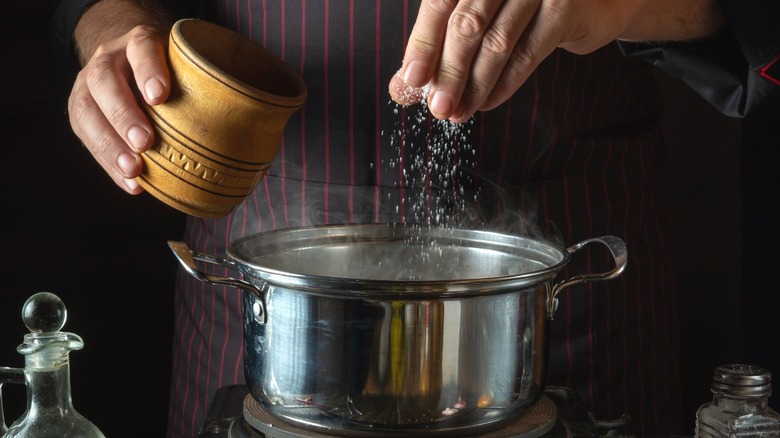The Simple Timing Rule For Perfectly Seasoned Soup Every Time
Good soup is always a treat, but great soup is a blissful explosion of flavor you won't soon forget. The difference between the two often comes down to how seasonings are incorporated into the dish. Home cooks will often studiously follow a recipe, adding each ingredient as it's listed. Typically, that translates to dumping all the seasonings in at once, which generally results in good soup. But if you're attempting to create an extraordinary dish, those flavors should be layered in over time, allowing them to evolve into a cohesive symphony of perfection.
It doesn't matter if you're making a crowd-pleasing three-ingredient butternut squash soup or something a bit more complicated; seasoning needs time to develop, especially salt. While most people might toss in salt with the rest of their seasonings, then give the soup a stir and try a spoonful, this doesn't give you a true understanding of how the dish will taste when it's finished cooking. Salt needs time to work its magic. This is exactly why soup often tastes better the next day. As it sits in the fridge, the salt and all the other seasonings continue to spread throughout the dish, creating a harmonious blend of flavor that makes your taste buds do a happy dance.
Salting soup as your last action is a misstep that won't give you any insight into how the seasoning will affect the dish once it dissolves. Adding salt from the get-go is a good rule of thumb, but don't stop there. Taste your soup again (and again, and again) while it's simmering to fully comprehend how your seasoning is impacting your recipe.
Taste, taste, taste until your soup is perfect
The key to achieving soup nirvana lies in tasting as you go, and often. Whenever you add a new ingredient to the dish — be it salt, stock, or veggies — scoop a spoonful and see how that ingredient affects the overall profile. This helps ensure the flavors are balanced and gives you clues as to what might be missing. As the soup continues to simmer, keep dipping your spoon and adding seasoning if it tastes muted or flat.
Another mistake people make is only seasoning the soup as a whole. But before you add them to the pot, even your proteins and veggies should be lightly salted to help create balanced flavor. By seasoning all the various components that go into the dish, you'll often find that you don't need to use a heavy hand while seasoning the soup as a whole because the flavors you added to the other ingredients enrich it on their own.
Of course, oversalting the dish is also a concern. As a soup simmers, it reduces, and the liquid elements evaporate, but the seasonings stay put. You can't remove salt once it's in a dish. Sure, you can fix an overly salty soup by adding stock or cream to tame the salinity, but tasting as you go, and incorporating seasoning little by little is the best way to create a flavorful soup that's perfectly seasoned.

